Currently live for bidding, Artnet Auctions presents Final Cut, the final major auction to wrap-up 2023. Reflecting on the incredible year of art sales and looking ahead to 2024, Final Cut includes top picks from our team of specialists. Featuring work by art world stars, auction debuts, plus perennial and always-in-demand favorites, this sale is not to be missed.
Below, specialists from across departments walk us through some of their favorites. Be sure to place your bids before the auction concludes on December 14, 2023.
Andy Warhol, Marilyn Monroe (Marilyn) (1967)
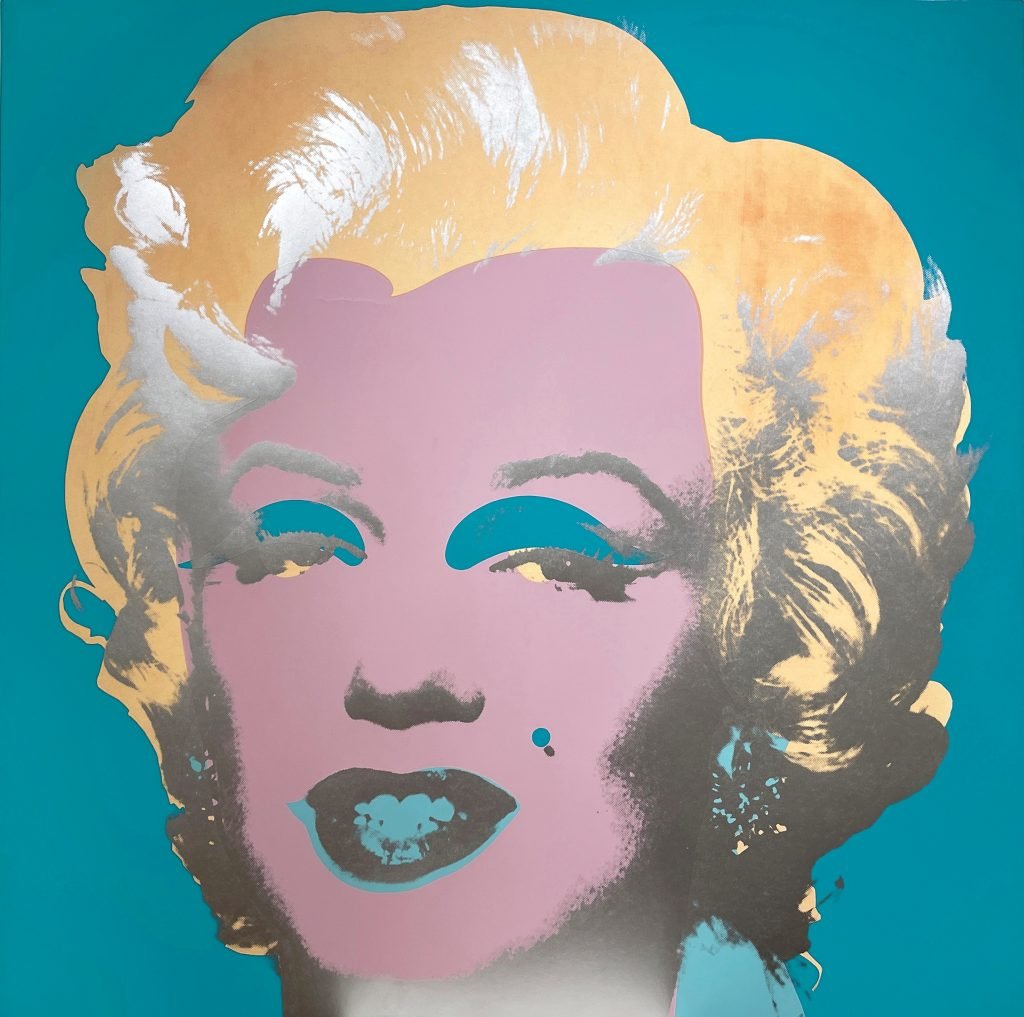
Andy Warhol, Marilyn Monroe (Marilyn) (1967). Est. $60,000–$80,000.
We are delighted to offer this signed proof screen print of Andy Warhol’s unequivocally most famous subject: Marilyn Monroe.
The work was produced in a portfolio of 10 prints, each rendered in a different color way—some more natural, and others, like this example, more jarring in contrast. The use of shifting colors and off-register effects—namely those in the lips, hair, and eyebrows—embrace the commercial processes of screen printing at the time, while also pushing its limits.
Factory Additions, Warhol’s own print-publishing business, published this print in 1967, and it was there that writer-actor-director Nelson Lyon hung out with Warhol and other cultural luminaries like William Burroughs. Known for gifting his work to friends, colleagues, and assistants, this particular Marilyn print was gifted from the artist to Lyon around 1967–68. It was acquired by a private collector in 1993, where it has remained until now.
—Conner Williams, Head of Prints & Multiples
Salvo, Eisleben (1999)
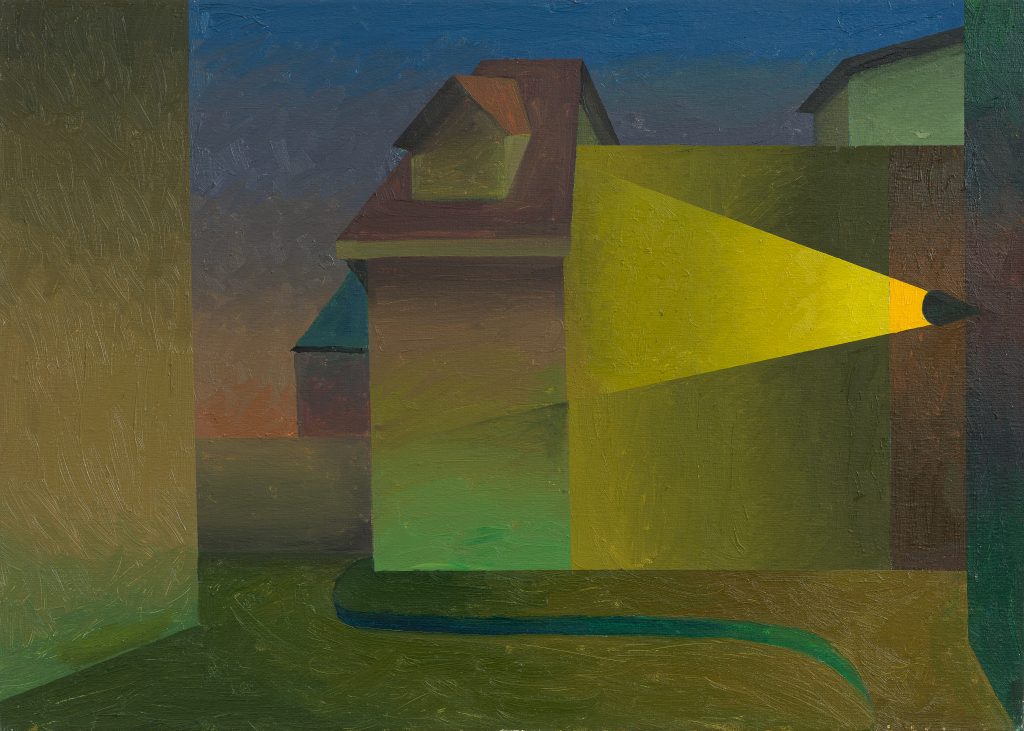
Salvo, Eisleben (1999). Est. $70,000–$90,000.
Salvatore Mangione, known as Salvo, became associated with the Arte Povera circle in the late 1960s, when he exhibited his conceptual works internationally alongside artists such as Alighiero Boetti and Sol LeWitt.
It was in the 1970s when Salvo returned to painting in advance of what would become known as the Transavantgarde movement. While the artist’s signature landscapes originate from real life, they are painted with radical color, simplified forms, and are notably devoid of any inhabitants. The resulting, intoxicating scenes teeter between the familiar and surreal.
The painting Eisleben (1999), depicting the foothills of Germany’s Harz Mountains, reveals a deserted avenue illuminated in the glow of a street lamp, while giving viewers a glimpse of a horizon which seems limitless in potential. Its masterful depiction of quiet solitude and light is reminiscent of the surreal cityscapes of Giorgio de Chirico or even the cinema of Antonioni Michelangelo.
This year has been a spectacular year for Salvo on the art market, with 9 of the top 10 auction records for the late Italian artist set in the first 10 months of 2023.
—Jason Rulnick, Senior International Specialist, Post-War & Contemporary Art
Ed Ruscha, Standard, Figueroa (1962)
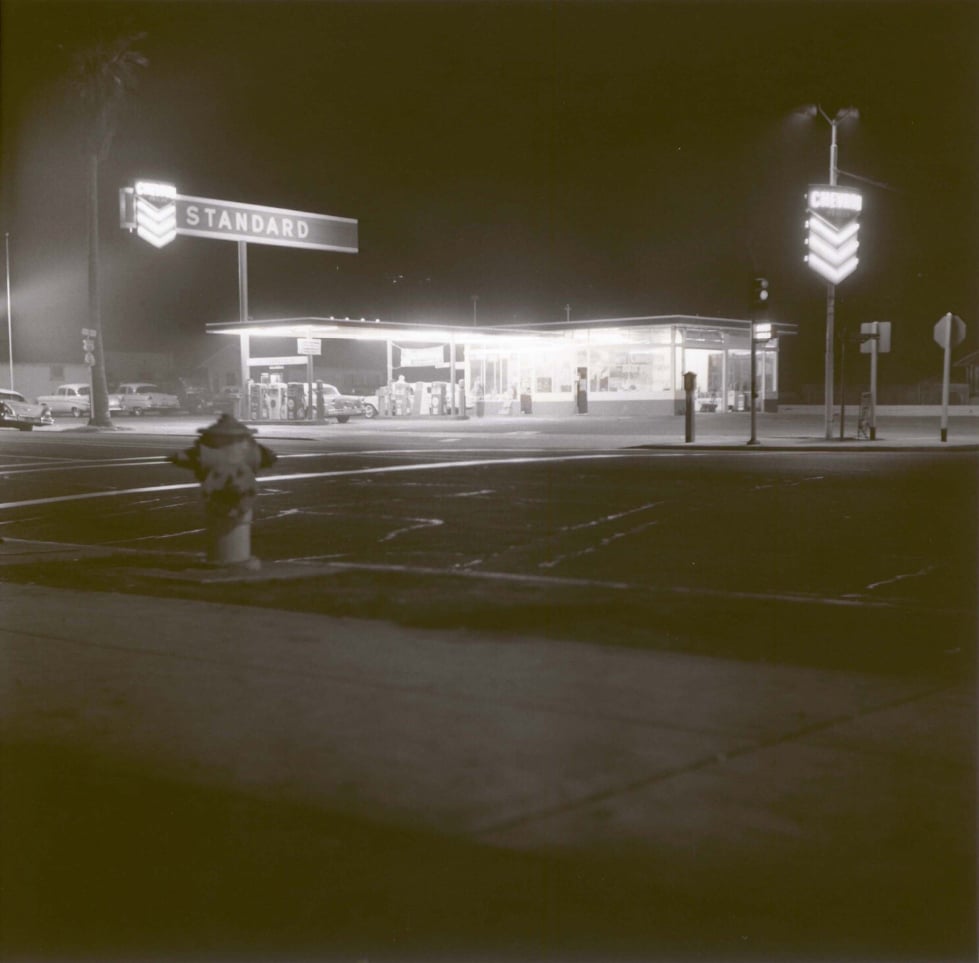
Ed Ruscha, Standard, Figueroa (1962). Est. $8,000–$12,000.
Ed Ruscha captured Standard, Figueroa in 1962 while creating his seminal photobook, “Twentysix Gasoline Stations,” which was shot along Route 66 from Los Angeles to Oklahoma City. This nighttime snapshot depicts the glowing Standard Oil sign, an emblem that became a ubiquitous and recurring motif in Ruscha’s work. The artist’s fascination with gas stations showcases his matter-of-fact style and sly humor, transforming mundane subjects into artful narratives. In a similar manner, Ruscha exhibited his self-published photobooks in galleries, where he surprised his audience with their minimal cost compared to large-scale paintings.
An earlier impression of the image is currently on view in his retrospective exhibition “Ed Ruscha / Now Then” at The Museum of Modern Art in New York. The show stands as the most comprehensive retrospective of the artist’s work ever staged. The image is also held in various institutions, including the de Young Museum, San Francisco, the J. Paul Getty Museum, Los Angeles, and Tate Britain, London.
—Anabel Wold, Specialist, Photographs
Keith Haring, Untitled 3 (from Untitled 1–6) (1982)
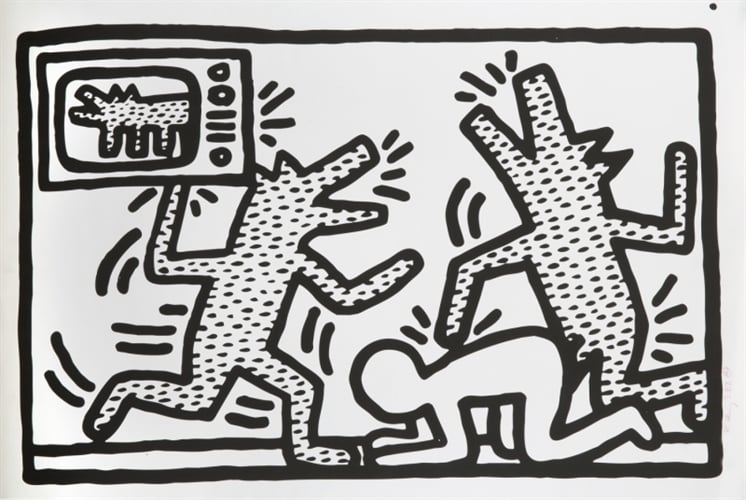
Keith Haring, Untitled 3 (from Untitled 1–6) (1982). Est. $20,000–$30,000.
This work by Pop great Keith Haring is part of a set of six lithographs, known as the “Gladstone Set,” which stands among the most rare-to-market set of prints ever produced by the artist. The set was produced very early in Haring’s career when he had just moved to New York. This was a seminal moment for the artist’s budding career, as he immersed himself in the city’s downtown scene, befriended artists such as Jean-Michel Basquiat and Kenny Scharf, and began making political street art.
Produced in a very small edition of 40 (plus eight artist’s proofs), the set was released during the show “6 Lithographs” that ran in the fall of 1982 at art dealer Barbara Gladstone’s gallery.
The year 1982 was a seminal one, marking Haring’s very first venture into print projects, which, by the end of his short career, would span over 60 editions. The present work illustrates what we have all come to know and expect in the work of Haring: imagery that shows the influence of TV and animation while addressing pop culture, politics, love, and death.
—Conner Williams, Head of Prints & Multiples
Vivian Springford, Untitled (Scuba Series) (ca. 1978)
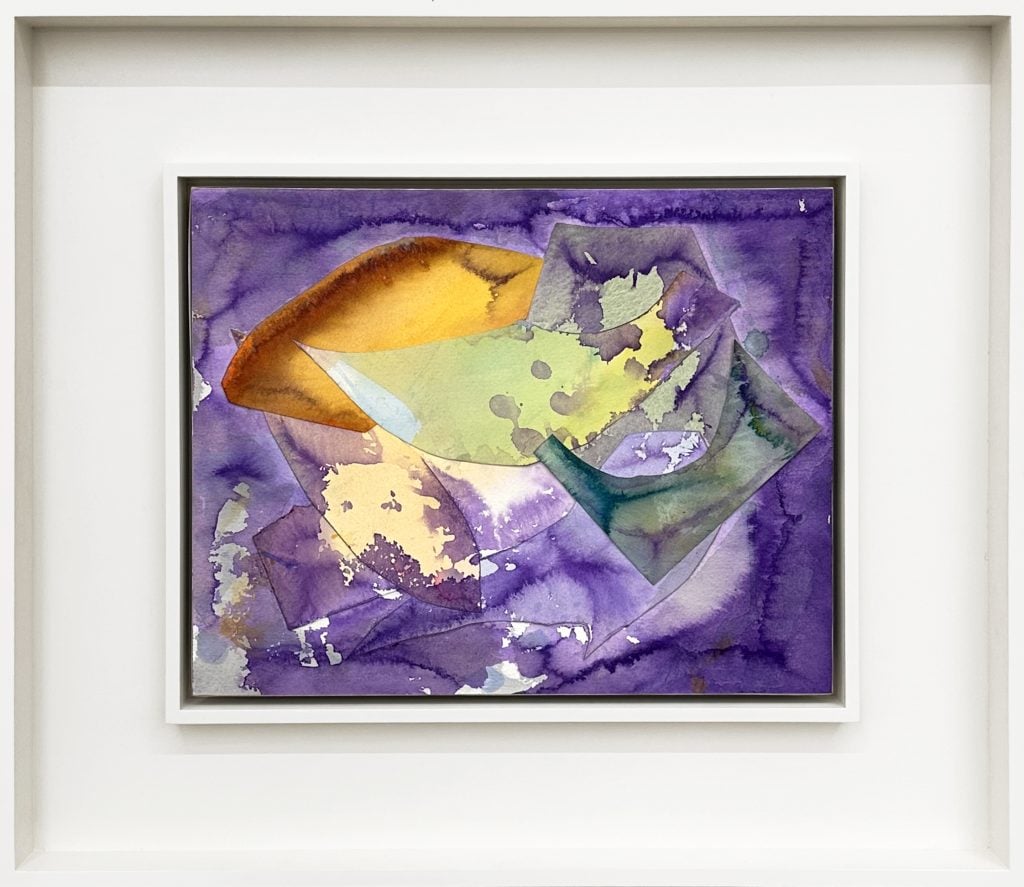
Vivian Springford, Untitled (Scuba Series) (ca. 1978). Est. $12,000–$18,000.
Vivian Springford burst onto New York art scene in the 1930s, and by the time she entered her most prolific stage as an artist from 1950s to 1970s, the art mecca was straddling the worlds of Abstract Expressionism and Color Field painting.
Springford’s emphasis on gesture was prompted by an early interest in calligraphy, and gradually evolved into more complex processes of applying color onto the canvas, including dripping and splattering thinned paint onto its surface over long periods of time.
In the slow pooling and layering of paint, she mimics the fluid shapes of organic forms—this is especially present in her works of the late 1970s, including works like this from the “Scuba” series. Springford’s paintings and works on paper oscillate between abstraction and figuration, defying categorization and inviting viewers on a journey to explore the ephemeral secrets of the natural world. While Springford acquired the vocabulary of the artistic movements which surrounded her, instead of adopting their styles she used them to create her own language.
Like many overlooked women artists in the post-war period, Springford’s incredible oeuvre and its true significance is only now being rediscovered. Her secondary market has been on the ascendant in the past four years, and some of her highest prices have been achieved in the last 12 months.
—Jason Rulnick, Senior International Specialist, Post-War & Contemporary Art
David Bailey, John Lennon & Paul McCartney 1965 (2000)

David Bailey, John Lennon & Paul McCartney, 1965 (2000). Est. $18,000–$22,000.
David Bailey is the world’s pre-eminent photographer of famous personalities, from Mick Jagger to Queen Elizabeth II, from the Kray Twins to Joseph Beuys. Inspired by the work of Henri Cartier-Bresson, Bailey’s black-and-white portraits are stripped down and dramatic.
This particular portrait is Bailey’s most iconic, signature work that presents John Lennon and Paul McCartney, shot in the middle of the Swinging Sixties.
It’s so exciting to offer this photograph shortly after the Beatles’ final single release, Now and Then. Giles Martin, a producer of this new track and a son of the legendary Beatles producer George Martin, has a theory: “I do feel as though Now and Then is a love letter to Paul written by John […] that’s why Paul was so determined to finish it.” (The New York Times, Nov 5, 2023). This iconic photograph embodies the close relationship between these two iconic musicians.
—Carys Lake-Edwards, Specialist, Photographs
Gabriel Orozco, Orbitas con seis puntos de gravedad (2005)
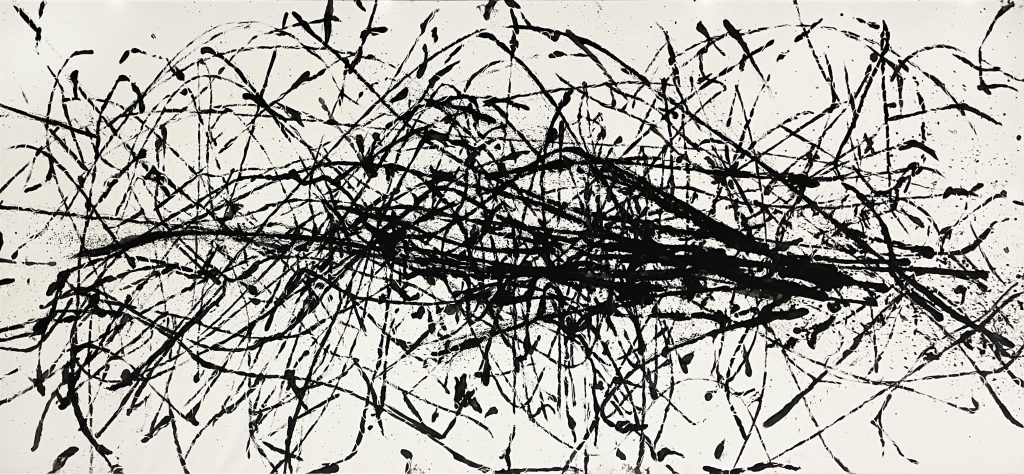
Gabriel Orozco, Orbitas con seis puntos de gravedad (2005). Est. $150,000–$180,000.
In 2005, Mexican artist Gabriel Orozco took part in the Villa Iris Virtual Arts Workshop in Santander, Spain. Run by Fundación Botín since 1994, the renowned workshop has been bringing together students to work with established artists such as Jannis Kounellis, Carsten Höller, Mona Hatoum, and Julie Mehretu, to name a few.
The present work, Orbitas con seis puntos de gravedad (2005), is the largest and most engaging result of Orozco’s time at the workshop and is a material symbol of Villa Iris’s deeply collaborative environment. With multiple hands holding the fabric up, the work was created by tennis balls drenched in paint being rolled gently across the fabric.
We often think of action painting as an act of energetic movement—famously reminiscent of Jackson Pollock—or of painting generally being a highly meditative and highly intellectual practice, like the Gutai group in Japan. In Orbitas, Orozco questions these assumptions by capturing a collective moment and whose lines are largely the result of chance, as the balls roll across the material.
Arguably the most famous living Mexican artist, Orozco’s works are displayed in numerous major museums around the world. This exciting work is an apt example of his entire oeuvre in how it questions mediums, forms, time concepts and the very nature of art creation.
—Martina Batovic, Co-Head of Post-War & Contemporary Art
Final Cut is now open for bids until December 14, 2023.
Follow Artnet News on Facebook:
